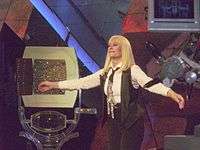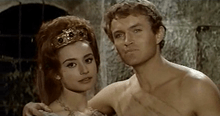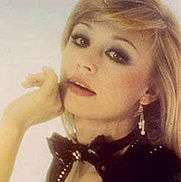Raffaella Carrà
| Raffaella Carrà | |
|---|---|
 | |
| Born |
Raffaella Roberta Pelloni 18 June 1943 Bologna, Italy |
| Other names | Raffaella Carrà, la Carrà |
| Occupation | Actress, singer |
| Years active | 1965–present |
Raffaella Carrà (Italian: [raffaˈɛlla karˈra]; born 18 June 1943 in Bologna), often simply known as la Carrà (the Carrà) and in some Latin American countries sometimes simply as Raffaella, is an Italian singer, dancer, television presenter, and actress. She is a popular figure in Europe and Latin America, both as a result of her many well-known taped presentations and records, and because of her many popular TV shows.
Early life
She was born Raffaella Roberta Pelloni, in Bologna,[1] and took dance lessons there early on. When she was 8 years old, she left Bologna to study at the National Dance Academy (Accademia Nazionale di Danza) in Rome, and started her film career in the '50s, playing the character of Graziella in Tormento del passato (1952), where she appears credited with her real name.[2]
Career
Actress

Carrà debuted in cinema at age nine, in Tormento del passato (1952). She did five other movies until 1960 when she graduated from the national film school of Italy. Also in that year, she appeared in Long Night in 1943 (1960). In 1965, she moved to the United States signing with 20th Century Fox. As Carrà, she starred in the motion picture Von Ryan's Express (1965) with Frank Sinatra, Edward Mulhare, and Trevor Howard. In 1966, she guest starred in an episode of the American television series I Spy (Sophia, as the title character). Feeling homesick, she decided to return to Italy where she starred in about twenty Italian films such as Le Saint prend l'affût and the Our Man Flint parody Il vostro super agente Flit (1966) as well as a few television shows. However, subsequently her acting career has been scarce with no more than five works mainly for television.
Singing and dancing
Since 1961, Carrà has sung and danced on the variety shows of Italian television. In particular, since the early 1970s, they have featured elaborate choreography, mesmerizing elaborate themes, and her uninhibited style. She was the first television personality to show her belly button on camera. This was met with heavy criticism from the Vatican and Catholic churches in the countries that watched her show, Canzonissima.[3]
Carrà had a hit song with the sensual "Tuca Tuca" (1970), written for her singing and dancing television presentations by her long-time collaborator and former boyfriend, Gianni Boncompagni. Similarly, in 1971 Carrà achieved another hit with "Chissà se va".
Her greatest international hit single was "Tanti Auguri" ("Best Wishes"), which has become a popular song with gay audiences. The song is also known under its Spanish title "Para hacer bien el amor hay que venir al sur" (which refers to Southern Europe, since the hit was recorded and taped in Spain). The Estonian version of the song "Jätke võtmed väljapoole" was performed by Anne Veski. "A far l'amore comincia tu" ("To make love, your move first") was another success for her internationally, known in Spanish as "En el amor todo es empezar", in German as "Liebelei", in French as "Puisque tu l'aimes dis le lui", and in English as "Do It, Do It Again". It was her only entry to the UK Singles Chart, reaching number 9, where she remains a one-hit wonder.[4] In 1977, she recorded another hit single, "Fiesta" ('The Party' in English) originally in Spanish, but then recorded it in French and Italian after the song hit the charts.

In 1985, Carrà's Starlight Express video was released featuring characters, costumes and sets from the show. "A far l'amore comincia tu" has also been covered in Turkish by a Turkish popstar Ajda Pekkan as "Sakın Ha" in 1977.
Recently, Carrà has gained new attention for her appearance as the female dancing soloist in a 1974 TV performance of the proto-rap funk gibberish song "Prisencolinensinainciusol" (1973) by Adriano Celentano. A remixed video featuring her dancing went viral on the internet in 2008.
In 2008 a video of a performance of her only UK hit single, 'Do It, Do It Again', was featured in the Dr. Who episode 'Midnight'.
Rafaella Carrà worked with Bob Sinclar on the new single "Far l'Amore" which was released on YouTube on 17 March 2011. The song charted in different European countries.
Television presenter
As a television hostess, Carrà has done significant work since the late 1970s, mainly in the Italian (RAI) and Spanish (TVE) national TV networks. One of her most celebrated series has been the Pronto Raffaella? gameshow (Italy, 1983–1985), in which she took phone calls from the public. The show's format was copied in many Latin-American Countries and Spain, in South America (in Argentina by Susana Giménez, in Peru by Gisela Valcárcel and in Brazil by Christina Rocha), with great success. Carrà hosted one such adaptation, ¡Hola Raffaella! (1992–1994) for Spanish television.
From 2008, returning by popular demand, Carrà hosts a variety show on Italian national and international RAI network, Carràmba! Che fortuna, the show in which the families around the world are reunited on live television.
In 2011 Carrà announced the results for Italy in the Eurovision Song Contest 2011 in Düsseldorf, after Italy were absent from the contest for more than 13 years.
In 2013, 2014 and 2016 she was one of the judges of the television talent show The Voice of Italy.
Spanish-language market
After her boom in the Italian market of the early 1970s, Carrà moved to Spain, doing television and releasing records in the Spanish language. This led her to move to South America, where her records had been heard for some years. In 1979 she established her headquarters in Buenos Aires, which was under a military dictatorship. Carrà was one of the figures of the ATC, the official television network of Argentina. She was very well received throughout Latin America, and filled the stadiums and theaters wherever she performed. In 1980 she filmed the Barbara musical romantic comedy, also in Buenos Aires, with the most important stars of the region. In that same year, five capitals of the world (Buenos Aires, Mexico City, Rome, Moscow, and London) joined up to celebrate her in a television special in Bhutan. After appearing in the Festival de Viña del Mar (1982) she returned permanently to Italy. She visited the city of Salto, Uruguay and performed a show in the Parque Harriague.
References
- ↑ Stradanove.net
- ↑ Scheda Imdb
- ↑ "Raffaella Carra - Italian Music" Retrieved 23 June 2015
- ↑ Roberts, David (2006). British Hit Singles & Albums (19th ed.). London: Guinness World Records Limited. p. 95. ISBN 1-904994-10-5.
External links
- Raffaella Carrà at the Internet Movie Database
- Raffaella Carrà at the MSN